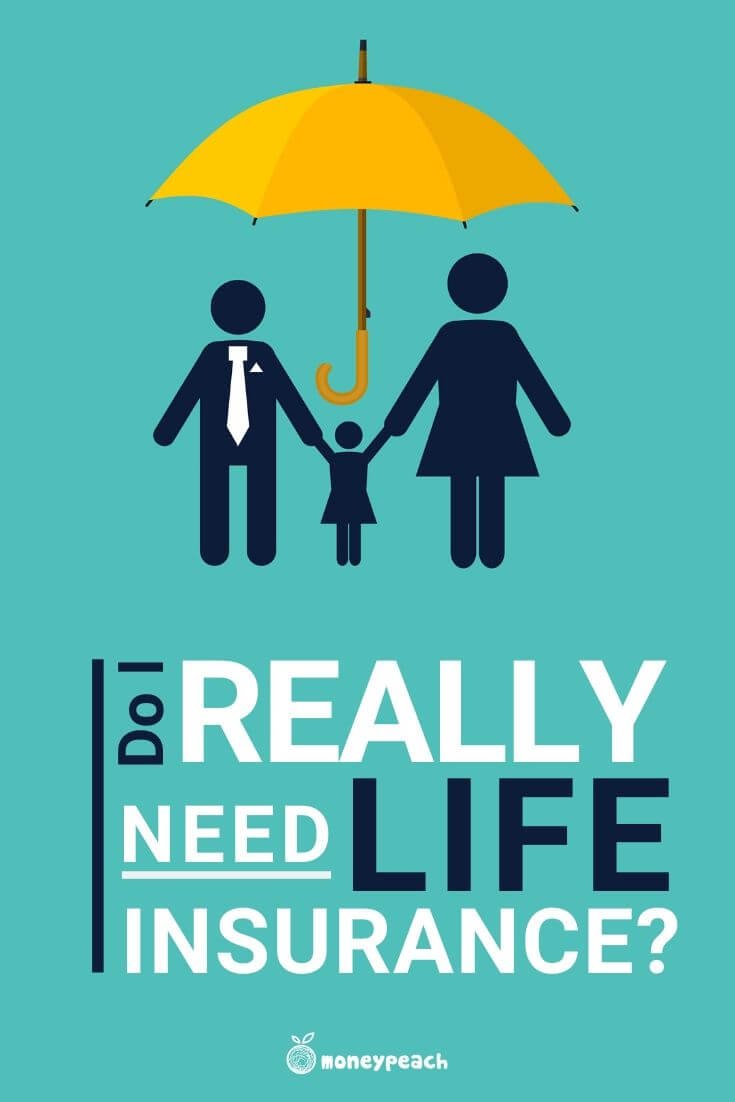Is Life Insurance a Good Idea?
Hannah Boykin’s parents didn’t think so.
And tragically, both of them passed away within 14 months of each other, leaving 6 kids behind (mostly teenagers) with no financial support.
The children were devastated, not just because they lost both of their parents, but also because they had to be split up. No one in the family could afford to take all of them at once.
Term Life Insurance is extremely affordable. I recommend 10-12x your income over 20-30 years. Get a real-time quote here.
I heard about Hannah’s tragic story from a friend who writes for a life insurance blog. My friend (Chris) had told me although Hannah faced the unthinkable, she still managed to graduate at the top of her class in high school and start a nursing program.
…but after being split up from her brothers and sisters, and suffering the effects of zero financial support in college, I can’t help but wonder how things would have been different for her family if life insurance had been in the picture.
I tell that story not to scare you into buying life insurance but to show that death can not only be unexpected, but it can also have a lasting impact beyond the loss of a loved one.
Fortunately, there’s a simple and affordable way to prevent Hanna’s story from EVER becoming your family’s story… term life insurance.
Do you really need life insurance?
The short answer is, most likely yes.
…let me explain.
If you rent or own a home, and can’t answer the question, “Where would my family be living 1 year from today if I suddenly died,” you need life insurance. (HINT: The answer should be in the exact same place they are living now.)
In fact, if anyone in your family relies on the income (or services) you provide, and would be impacted financially by your death, you need life insurance.
According to popular insurance blog Lifehappens.org, the top four reasons people buy life insurance are as follows:
- Cover burial and other final expenses
- Replace lost income
- Pay Off Debt
- College Planning
Between all of these, most people are covered. Let’s take a look at each one in turn:
1 – Help replace lost income
At the outset, I asked, “If you were to die tomorrow, where would your family live a year from now?“
How about 3 years? Will your spouse still be able to make rent or mortgage payments? Will your kids still be able to do sports or other extracurricular activities?
If you’re the breadwinner in your relationship, losing your income could limit your family’s future, especially if you still have 2 or 3 decades left in your working career.
Term life insurance is the best way to cover lost income. It’s cheap and flexible. For example, a 35-year-old male in good health could get a 25-year $1,000,000 term policy for as little as $35 per month.
…you’re not stuck with 25 years either. You can typically choose between a 10-, 20-, 30- or even 40-year term.
2 – Cover burial and other final expenses
Whether or not you have people depending on you financially, you can’t escape these expenses.
…funerals and burial aren’t cheap either, running just over $8,000 on average.
With over 70% of people living paycheck to paycheck and 6 out of 10 people unable to write a check for $1,000 in an emergency, a funeral expense would be a major blow.
The average family would be facing the loss of a loved one and the sobering reality that the only option to honor your loved one at the funeral is to go deep in debt or set up a GoFundMe account.
With term life insurance, you can easily cover the burial and other final expenses for pennies per month. I of course would recommend you get much more life insurance than just $8,000 and we will see why in our next example.
 3 – Pay off debt
3 – Pay off debt
Debt can weigh you down in any financial situation, but more so when you’ve just lost a loved one.
That’s why a lot of people get life insurance to help their spouse pay off debt — including their credit cards, student loans, auto loans, or any type of debt that would burden a family if you were to die prematurely.
…but what about the mortgage?
Basically, you might want to consider getting enough coverage to pay off all debt — including your mortgage. Again, it’s not about getting rich. It’s about preserving your family’s way of life.
4 – College planning
Planning for college is a huge obstacle for most families. The never-ending rise in college tuition, paying for room and board, and everything else that goes along with college planning can seem daunting.
Now, imagine if you were left to plan for this alone and without help from your partner’s income? How much harder does college planning become now? Term life insurance solves this problem for your loved ones who are left behind after you’re gone.
By getting term life insurance now, the burden of paying for college goes away if something were to happen to you. The last thing your loved ones should have to worry about is how to pay for college when you’re gone. This is just another reason why life insurance is so valuable.
3 tips to help you get started
As you can see, there aren’t many situations where you don’t need life insurance.
So, to help you get started on the right foot, here are three tips:
1 – How to buy life insurance
I recommend finding the best life insurance company and at the best price. Instead of visiting 20 different websites, I would use a search engine dedicated to only searching for life insurance companies.
Policygenius will take your information such as age, gender, health habits, and where you live and search for you. In just a few minutes, you will be given dozens of quotes from some of the largest and most reputable life insurance companies in the industry.
Also, I use and recommend Policygenius because I know they will only show offers from the top life insurance companies, they are able to provide extremely accurate real-time quotes, and most importantly — they do all of this without requiring your contact information.
2 – Choose the Right Amount and Term
The number one question I receive about life insurance is how much coverage they should have. A good rule of thumb is to have 10x – 12x your current gross income in coverage.
If you earn $80,000 per year, then a good rule of thumb would be to have $800,000 – $1,000,000 in coverage. This amount helps not only replace your income for years to come, but also pay for things like burial expenses, pay off debt, and plan for college.
As far as how long you should have coverage (the term), I would recommend no less than 20 years and no more than 40 years. To narrow that range down, I would start thinking long-term and decide how long you will need a policy in place. A great question to ask yourself is how long will it take me to be worth my coverage amount.
If you elect to get $ 1,00,000 think it will take you 25 years to be worth that amount, then a 25-year Term is a great start.
3 – Use these ways to save
There are several ways to save on life insurance, but here are the top three:
- Lose a few pounds – There’s a 25% price difference between health classes, and in many cases, they’re separated by only a few pounds or a few cholesterol or blood pressure points. Take a week to exercise and eat well to improve your health prior to applying for coverage, and you could save 25% to 50%.
- Do the medical exam – No-exam life insurance sounds tempting — who else hates needles? But these policies cost 10% to 40% more because the insurance company can’t assess your health risk as well. So, unless you have major health problems or have an urgent need for the coverage to take effect, take the exam.
- Eliminate Tobacco – I recently saw someone get a quote for $1,000,000 in Term Life for 25 years. The cost in the quote was $48/month. However, once they did the medical exam there were traces of tobacco found in their blood work. This caused his new quote to increase to 396% to $190/month!
Why Life Insurance is so Important (to me)
In 2014 I was talking to a friend and his wife about all the reasons to buy term life insurance above. He was a firefighter and his wife stayed home with their three daughters.
Chris had asked me why he needed life insurance if he already had it through his employer as a firefighter. I agreed the job of a firefighter was extremely dangerous, but my question for Chris and his wife was what if he lost his life off-duty?
Two years after that conversation, I received a call that Chris was killed in an ATV accident. He left behind his high-school sweetheart and his three young daughters. We were all devastated — Chris was the absolute best.
A few months after Chris’s passing, I met with his wife Kerry to help her answer some of the challenges of handling all of the finances on her own. During our conversation I finally had the courage to ask her — did Chris ever get Term Life Insurance?
I am so happy to tell you Chris did get coverage after we spoke that day.
Because he chose to take the initiative and get life insurance then, his family doesn’t have to worry about the finances today. Of course hey will never get back what matters most to them, but I know Chris is smiling down from above knowing he didn’t leave his family with a financial burden after his sudden passing. He protected them.
I tell this story with his wife’s blessing. She told me she doesn’t know what would have happened or how they would have survived without Chris getting life insurance when he did. When I asked her if I could share this story with the public, she told me I better.
Her words: “Please tell as many people as you can about what Chris did for us before he left us — ”
Covid-19 Update to this Post
Since the start of COVID-19, many people have been asking about the effects of COVID-19, the vaccine, and the ability qualify for life insurance if you have been infected with COVID-19.
Here is what we know as of right now:
Will the COVID-19 Vaccine Void My Current Life Insurance?
The short answer is NO.
According to the American Council of Life Insurers, they state the following:
“The fact is that life insurers do not consider whether or not a policyholder has received a COVID vaccine when deciding whether to pay a claim.”
“Life insurance policy contracts are very clear on how policies work, and what cause, if any, might lead to the denial of a benefit. A vaccine for COVID-19 is not one of them.
“Policyholders should rest assured that nothing has changed in the claims-paying process as a result of COVID-19 vaccinations.”
Will the Unvaccinated Still Qualify for Life Insurance or for the Death Benefit?
The short answer is YES.
As of right now, if you are unvaccinated and die as a result of COVID-19, your beneficiary will still get the death benefit.
Yes, I know that sounded a little morbid…
Also, rest assured if you are unvaccinated you can still qualify for life insurance.
Betsy Hoylman, a spokesperson from one of the largest life insurers (Northwestern Mutual) said in a recent interview:
“…while vaccination status is not a concern for the majority of its applicants, the company is asking for vaccine status from a small number of people who have high risk conditions”, says spokeswoman Betsy Hoylman.
With that said, she also added that people can be unvaccinated and still qualify for the best rates.
Can I get Life Insurance if I have had COVID-19?
The short answer is YES, but it may cost you more.
According to ValuePenguin, a site dedicated to gathering facts and data on financial products including life insurance, recently posted this:
“If you’ve been infected with the coronavirus or have recently traveled to a region with a heavy outbreak, applying for life insurance could take longer and be much more expensive. More recently, some insurers have stopped selling policies to customers older than a certain age. Terms and rates may change as life insurance providers continue adjusting to the situation.”
Now, this is eye opening because this wasn’t the case prior to COVID.
But it also makes perfect sense.
You see, life insurance rates are for the most part based on your age and gender. A third factor to creating life insurance rates are based off of the actuarial statistics used to determine your life expectancy.
With that said, it’s understandable why life insurance companies may start increasing their rates for those who have already had COVID.
If data supports that COVID-19 is lowering the life expectancy, then you can expect rates to increase.
Remember, life insurance companies don’t go off what “feels right”.
They go off the data and the number from that data (actuarial statistics).
The Takeaway
We all believe we’re invincible, but the fact of the matter is that unexpected deaths happen all the time. What’s more, life insurance gets more expensive as you get older.
So it’s time to make a choice…and I really hope you do.
If you want to be able to protect and provide for your family (even if you’re not here), you can click here to start with a free quote right now — It literally takes less than 1 minute!
I know… that’s some bigtime superhero, life-after-death talk right there, but I’m being serious.
The alternative is to leave your family’s well-being in the hands of chance, who could face serious obstacles without you.
To achieve instant “hero” status, make sure your loved ones are protected, and punch death in the face, get a quick and easy quote now!







2 Comments
My wife and I are looking into getting life insurance now that we are both working full-time. I like your point about how you can get free quotes online for it. We’ll be sure to start looking into this so we can narrow down our choices.
We don’t need it after becoming FI but it makes my wife happy so she still has a large policy on me. Personally every time we hike around cliffs it makes me very uneasy being worth far more dead than alive!